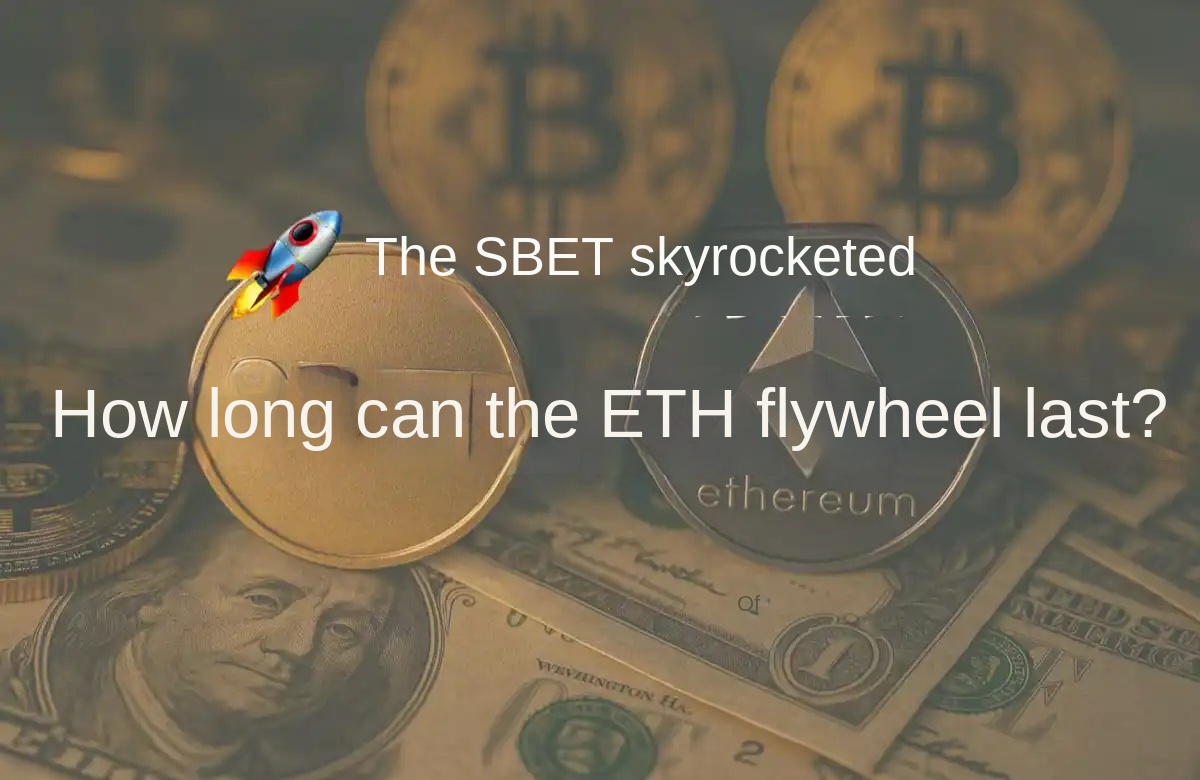A 400% Surge in One Week: Who Is the True SOLana Version of MicroStrategy
Driven by projects such as Robinhood, xStocks, and Republic, a large number of companies' on-chain "stocks" have emerged in the Solana ecosystem, sparking an unprecedented "coin-stock linkage" experiment. Upexi, after continuously accumulating SOL over the past few months, has surpassed a holding of 730,000 coins, becoming the Nasdaq-listed company with the most SOL. Recently, the company announced that it will tokenize its SEC-registered stock on Solana through the Opening Bell platform under Superstate.
Another "SOL Microstrategy company," SOL Strategies, is also planning to list "tokenized stocks" on the same platform. Both are trying to build a three-tier circular structure, leveraging traditional equity (or debt) financing to purchase SOL assets, unlocking liquidity through on-chain tokenization, and ultimately amplifying capital circulation through DeFi protocols.

The success or failure of this model will directly impact the integration process between traditional finance and on-chain finance.
Have Companies Buying SOL Really Made Money?
Both companies, set to launch on Opening Bell, have SOL as their core asset, but their financing models and holding strategies differ. In terms of funding scale and execution, Upexi has chosen a more aggressive path. On April 21, 2025, Upexi announced a $100 million fundraising through a PIPE private placement, led by the well-known crypto market maker GSR. They issued 43,859,649 common shares at a price of $2.28 per share. After deducting operational expenses, about $530 million was used for debt repayment, and the remaining funds were allocated to establish the SOLana treasury and increase SOL holdings. According to company executive Arif Kazi, the pricing per share in this funding round was higher than the market price at the time and did not include any lock-up or token vesting clauses. Upexi promptly purchased SOL assets thereafter, and as of June 30, their SOL holdings had reached approximately 735,692 coins, valued at around $110 million at market price. The main three purchase prices were $135.22, $141.10, and $151.50, with a weighted average cost of about $142 per SOL. This portion of SOL assets currently holds about a 10% premium compared to the present price of $157 per SOL.

And in a recent announcement, the company plans to earn a yield of approximately 7%–9% annually by staking SOL, and will expand into mining, nodes, staking, and DeFi within the SOL ecosystem. If, as stated in the announcement, a majority of SOL is already staked, and assuming no reduction in holdings and minimal price fluctuations in SOL, Upexi's annual yield on SOL staking will reach $8.8 million. These earnings will not be directly shared with company shareholders but will be added to the treasury to increase asset value directly, thus raising the NAV per share, which represents the "SOL-inclusive" value per share. Based on 38.2 million outstanding shares, each share corresponds to approximately 0.0192 SOL (valued at around $2.97). The cumulative staking rewards may further drive up the per-share SOL value, thereby supporting an increase in the stock price.

On the other hand, SOL Strategies has employed a convertible bond financing approach. On April 23, 2025, the company announced a $500 million convertible bond arrangement with ATW Partners, specifically for purchasing and staking SOL. An initial $20 million funding tranche was received around May 1 for purchasing SOL and staking it in their validator node, with the remaining $480 million available to be drawn down in tranches based on market conditions. This convertible bond can be converted into company stock at market price, and interest is paid at an 85% staking yield calculated based on actual staked SOL received.
As of June 30, SOL Strategies' SOL holdings have increased from the initial approximately 267,321 coins (valued at around $40 million) to 392,667 SOL, with an average purchase cost per SOL in USD equivalent to approximately $153.53. Looking at the coin price, there has been little to no significant loss or gain.

Their report shows the current average yield on staked SOL is around 7.53%. While some of the earnings are similar to Upexi's in that they are reinvested in the treasury or node staking to increase NAV per share, the agreement in their collaboration with ATW Partners dictates that 85% of the staking rewards generated from staking SOL purchased through the facility will be paid out in SOL form to the bondholder as interest, creating a relatively self-sustaining financial loop from day one of capital input. Additionally, in terms of the conversion clause, the convertible bond can also be converted into company stock at market price, specifically at the market price of the day before conversion. This arrangement is exempt from registration under Canadian and U.S. securities laws, aligning with the Ontario Securities Commission Rule 72-503 and not subject to the statutory hold period under Canadian securities laws.
Can On-chain Continuation Uphold Asset Net Asset Value Premium as Stock Price of Buying the Shanzhai Public Company Collapses?
Whether in the form of PIPE or convertible debt financing to purchase SOL, both Upexi and SOL Strategies have validated in some form the feasibility of the functional yield of assets such as SOL. However, this is only the first two steps, and there have indeed been some systemic risks in the stock price trend.
For example, after Upexi reported the PIPE financing on April 21, 2025, the stock price soared from about $2.3 to a intraday high of $16.8 on the same day, an increase of up to 630%. However, with the PIPE share unlocking on June 23 and investor registration resale, the stock price plummeted by about 60% in a single day, and then further dropped to around $3.26 on the 25th, nearly a 77% collapse in just two days, almost wiping out the previous stock price surge. After the financing was completed, Upexi's per-share net asset value premium quickly rose from about 4 times to over 7 times, but rapidly fell back after the PIPE share unlocking, and is now close to the per-share NAV level.

SOL Strategies' initial financing form and acquisition method were not as aggressive as Upexi's, but they also encountered similar issues. After announcing convertible bond financing on April 23, the stock price rose by over 18%, closing up 7% the next day. By early June, after disclosing Q2 financials and on-chain trials, the stock price rose from 1.8 Canadian dollars to 2.42 Canadian dollars, an increase of about 34% during the above period. However, by July 2025, the stock price had retraced about 60% from its high point, and its NAV premium also dropped from about 5 times in Q2 to around 4.5 times.

The Next Channel of Buying Coin Public Companies — Opening Bell
In fact, most "coin-stock concept" public companies have encountered similar predicaments. Taking advantage of the recent trend of "US stocks on-chain," Upexi and SOL Strategies have taken the lead in initiating the transformation of on-chain stock strategies and market structure. After Superstate launched Opening Bell, the Canadian public company SOL Strategies announced plans to list on Nasdaq, but before ringing the Nasdaq bell, they chose to first "ring the bell" on Superstate. On May 8, 2025, they first announced that their company's stock would be listed on the platform, and following regulatory approval, SOL Strategies' stock will trade on Solana this summer. Following closely, Upexi announced on June 26, 2025, that they would tokenize their shares through the Opening Bell platform, becoming the platform's first participants.
The Opening Bell is currently set to debut on Solana first (with plans for other chains such as Ethereum in the future), interacting with the USTB and USCC issued by Superstate, and the company's shares will be recorded and tokenized by Superstate's SEC-registered, blockchain-enabled share registry agent. Unlike other "mirror tokens," this form will not be a synthetic exposure or wrapped token, but rather the company's actual shares being truly ledgerized for the first time. And in a ceremonial touch, similar to Nasdaq, Superstate has indicated that the company's listing on Opening Bell will be marked by a synchronous bell-ringing at Superstate's New York headquarters.

For companies already listed, Opening Bell provides a "virtual cross-chain bridge" from the physical world to the crypto world, while for companies not yet listed, Opening Bell is more like Nasdaq or NYSE's "Pre Market," offering the ability to open up shares to crypto-native markets, providing a different funding exposure for future "official listings."
Can Opening Bell Really Save "Stock Token" Concepts?
Currently, whether it's Upexi, SOL Strategies, or other coin-buying companies, the core support for their NAV per share comes almost entirely from the market value of SOL they hold. Many in the community are concerned whether they will use a Russian doll path to create a "stock token bubble," financing the purchase of SOL through PIPE or convertible bonds, then tokenizing company stocks on-chain, and using the stocks as collateral assets in DeFi for lending, thereby releasing new investable capital, achieving a flywheel structure of "Buy SOL—Collateralize—Reinvest."
However, the stock issuance and trading on the Opening Bell platform are still under strict regulatory scrutiny. The platform requires investors to undergo KYC certification and complete relevant education before being able to hold "On-chain Shares" in pre-approved whitelist wallets, with whitelist rights currently limited to existing shareholders, investors KYC'd through Superstate, and compliant "KYC" partner wallets. In other words, on-chain stock transactions are currently limited to approved accounts, and investors cannot freely deposit tokenized stocks into any DeFi protocols for collateralization and lending.
At the same time, Superstate and institutions like the Solana Policy Research Institute have submitted a pilot proposal called "Project Open" to the U.S. Securities and Exchange Commission. The proposal envisions allowing some U.S. companies to issue, register, and trade their stocks natively on public blockchains like Solana within a restricted issuer range. The trading process also needs to be completed in approved whitelist wallets, with regulatory agencies having the authority to intervene and modify at any time. If the SEC ultimately approves, it means that stocks can achieve global 24/7, real-time settlement like cryptocurrencies; if not, the traditional trading model will continue.
The Radical Experimentalist Superstate
Compound founder and Superstate founder Robert Leshner stated in an interview that he is betting on a new generation of cryptocurrency-first investors. "This is a huge wave of capital. They don't care about brokerage accounts; they care only about blockchain wallets and want to trade in ways that they are used to. I really believe this is an entirely new capital market, ready to embrace institutional entry at any moment." He added, "Hedge funds and venture capital firms globally have fallen in love with crypto-native channels," pointing out that Superstate has 150 institutional clients worldwide, including notable institutions such as Arrington Capital, BitGo, CoinFund, Flowdesk, and ParaFi."
Not only did he talk the talk, but on July 14, Superstate founder Robert Leshner shared a link to an SEC 13D filing on X, indicating his plans to acquire 57% of YHC's shares (most shares purchased at $3.77 per share, roughly totaling about $2 million), a lower-market-cap, somewhat dubious history alcohol company. He further stated that the next step involves board changes and helping the company explore new strategic directions.

Following the news, the initially $2 million market cap listed company saw an over 300% surge within just one week, reaching a market cap of $11 million.

However, just 4 days after the acquisition announcement on July 18, Robert Leshner announced the abandonment of the control battle for LQR Corporation, stating that due to the company's continued issuance of new shares diluting shareholder equity, his holdings no longer held effective control. Leshner then expressed that he would not initiate proxy or legal battles and plans to recommend community experts to LQR to help establish a cryptocurrency treasury. He emphasized that this incident highlights the opacity of traditional markets in share tracking, a problem he believes cryptocurrency technology can solve. With the news out, the company's market cap once again dropped by 40%.
Some community members speculate that while acquiring a "shell corporation" to build a cryptocurrency treasury is common nowadays, this incident may not be that simple. Jason Kam, founder of Folius Ventures, believes there is a high likelihood that Robert acquiring this low-cost shell company is to retain some kind of "optionality" as he advances the Superstate business he is developing.
He speculated on several possible development paths, "Robert Leshner and some partners in discussions inject a business into YHC and then force through the Superstate process, making it a demonstration of stock tokenization," or "Robert Leshner directly incorporates Superstate into YHC," or possibly "Robert Leshner uses this company as his own holding platform, driving his investment behavior through physical contributions or matching methods on one hand, and promoting Superstate's business development on the other."

Jason Kam also added, "Of course, it's also possible that nothing will happen, and he just holds onto this shell company for now."
Summary
This path undoubtedly provides more entry channels for institutional investors. However, whether it can sustain the net asset value premium in the long term still depends on the sustainability of the underlying assets. Unlike Bitcoin, which has strong consensus, SOL, as a yield-oriented asset, relies more on scenarios such as staking and DeFi usage to maintain its value anchor. If on-chain stocks cannot be quickly absorbed by the DeFi ecosystem and integrated, such companies are more likely to be seen by the market as a "MicroStrategy knockoff," and their valuation system will quickly revert to the old path of "discounted SOL position + discounted traditional business" instead of entering a new paradigm of "asset tool enterprise."
Upexi has taken the lead by listing its stock on Webull Corporate Connect and launching Nasdaq derivative trading, while also laying out a tokenization path on-chain through Opening Bell. Its dual-market trading structure means that its stock price fluctuation depends not only on the company's fundamentals and SOL price but also on factors such as on-chain settlement and leverage squeeze. This high-leverage structure may attract the attention of crypto arbitrageurs and professional DeFi users in the short term, bringing in influxes of capital and valuation spikes, but it also means that the stock price will become "tokenized," and its volatility may far exceed what traditional market investors can tolerate.
Once on-chain leverage becomes too high and asset prices fluctuate dramatically, the reverse liquidation mechanism may rapidly turn a "stock price surge" into a "stampede collapse." For companies attempting to achieve NAV premium continuation through "on-chain extension of life," this is a double-edged sword. If a genuine on-chain financial closed loop is not established, the pricing of such companies is more likely to return to the "crypto position + revenue discount" model, and the valuation space they originally hoped for may be compressed.
Welcome to join the official BlockBeats community:
Telegram Subscription Group: https://t.me/theblockbeats
Telegram Discussion Group: https://t.me/BlockBeats_App
Official Twitter Account: https://twitter.com/BlockBeatsAsia
 Forum
Forum OPRR
OPRR Finance
Finance
 Specials
Specials
 On-chain Eco
On-chain Eco
 Entry
Entry
 Podcasts
Podcasts
 Activities
Activities









